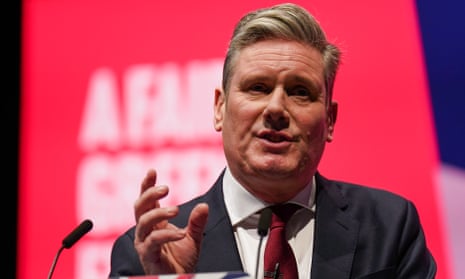We are in the golden hour. That may sound warm and pleasant – as if we have entered those long-promised sunlit uplands – but you need only look around at the economic devastation wreaked by Liz Truss and Kwasi Kwarteng in the past week to know that’s not what I have in mind. Rather, I am using the phrase in the sense deployed by police: the golden hour refers to the period immediately after a crime has been committed, when evidence is in abundance and detectives need to move fast to collect it. We are in the political equivalent of that period right now, and it’s Keir Starmer who cannot afford to waste a second.
Of course, the Labour leader begins with an advantage denied to most investigators: the identity of the perpetrators is already known. Hence the epic shift in the opinion polls, with the Conservatives now a staggering 33 points behind Labour, according to YouGov. If that swing were uniform across the country (which it won’t be), there would only be three Tories left in the next House of Commons. Three.
But Starmer still has work to do if he is to make the current mood last. He has to convince the court of public opinion that there are no mitigating circumstances, that blame lies entirely with the prime minister, her chancellor and the party that has governed this country for 12 long years. He has to do much more than simply point a finger at those in charge. He has to craft a narrative that sticks in the public mind, one that endures even when the shock of the current havoc is no longer fresh.
In that effort, he’s helped by the fact that the British economy now resembles a crime scene. The pound tanked, the cost of borrowing for both government and homeowners has leapt and the latter is only going to get higher. The Bank of England had to make a £65bn intervention on Wednesday, to deal with the fallout of a fiscal statement that, as one online wit put it, departed from the norm: usually an emergency budget solves an emergency rather than causes one. The International Monetary Fund has put the UK on economic suicide watch, anxious that its serial acts of self-harm could start hurting others.
But making it stick, that’s the challenge for Starmer. The model here is the response of George Osborne and David Cameron to the financial crash of 2008-09. Swiftly, they told a tall tale in which an increased deficit was the consequence not of a global credit collapse rooted in the US property market, but of Gordon Brown’s supposed profligacy. Brown had been incontinent with public money, they claimed. That – rather than the emergency measures required to plug the hole in the global financial system – was to blame for the deficit.
Blessed with a rightwing press eager to amplify that fairy story, and admirable message discipline, the Tory duo seared that narrative into the public mind so effectively, it won them not one election but at least two. It saw off Brown in 2010, while the accusation of Labour economic incompetence hobbled Ed Miliband in 2015 too. It remained a staple of Tory rhetoric. Labour had crashed the car into the ditch: it should never again be trusted with the keys. Rinse and repeat.
With that, the Tories were only building on a message their predecessors had crafted decades earlier. Think of the years of valuable service put in by that workhorse of a political slogan: the “winter of discontent”. The narrative the Conservatives constructed out of the events of 1978-79, again faithfully sustained by their Fleet Street cheerleaders, similarly suggested that Labour ineptitude and misrule disqualified the party from power – and it served the Tory cause for more than a generation. (Brown and Tony Blair tried to perform the same trick on the Conservatives with Black Wednesday but, with fewer media allies, it enjoyed a much shorter afterlife.)
At this moment, when we’re in the midst of the crisis, it can seem as if Labour need do nothing: let events themselves be the message. And there’s no doubt that, when it comes to political communications, voters’ own experience is the most potent copywriter. Right now, it is the experience, and fears, of middle-class Britons with pensions and mortgages that should prove the Tories’ undoing: Kwarteng’s mini-budget aimed a torpedo at the interests of the Conservatives’ core voters.
But the intensity of this moment will pass. Which is why it’s now, during the golden hour, when people are paying attention and when views are still fluid and mouldable, that Starmer has to ensure the account of what’s just happened – and who caused it – that becomes fixed in the folk memory is the one shaped by him.
Truss and her ministers are already pushing their alternative narrative. Now, when the evidence is strewn all around the ground, it seems laughable. Derision is surely the only suitable response to Truss’s insistence to a string of BBC local radio interviewers on Thursday that the man to blame for turmoil on the markets is Vladimir Putin for his invasion of Ukraine, and that her greatest sin was wanting to help hard-pressed Britons with their energy bills. That won’t wash because – at this moment – we all remember the sequence of events. Sterling didn’t crash when Truss announced her action on energy bills. It wasn’t that move, on 8 September, that panicked the markets. It was Kwarteng’s statement on 23 September – handing out tax cuts that were economically illiterate as well as morally indefensible – that did that.
That’s clear to us now, because memories are fresh. But as every detective knows, recollections become hazy with time. Especially if the culprits and their vocal friends are spreading a false, but compelling, story of their own. There’ll be talk of global shocks and international volatility, as if Truss is defending Britain against that storm rather than having recklessly exposed us to it. They’ll keep saying it; front pages will keep repeating it and, before you know it, there will be a body of voters who lament the fate that has befallen the UK economy but can’t quite name the guilty party.
To head off that danger, Starmer has to do to Truss what Osborne and Cameron did to Brown and Labour. This is on you, he has to say. You and your crazed ideological experiment, which treated Britain as a laboratory, and its people – their homes and their savings – as guinea pigs. Kwarteng’s kamikaze budget was the culmination of 12 years of similarly failed Tory experiments, starting with the cruelty of austerity. (If Starmer wanted to be completely honest, he’d include Brexit – but I understand why he won’t.) So never again lecture us on economic competence. Forget driving into a ditch: you drove the car off a cliff.
Starmer can choose his own words and his own metaphor. But he needs to tell the story of this crisis so that it hangs around the neck of Truss and the Tories for a decade at least. The golden hour is short – and the time to strike is now.
Jonathan Freedland is a Guardian columnist. To listen to his podcast Politics Weekly America, search “Politics Weekly America” on Apple, Spotify, Acast or wherever you get your podcasts

